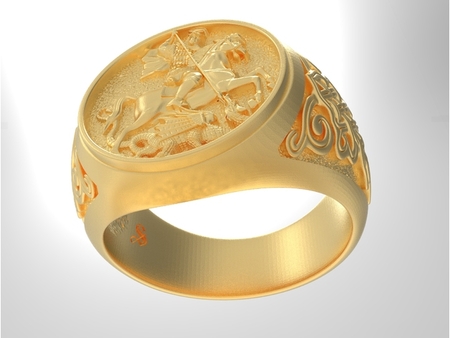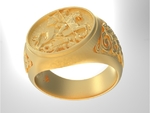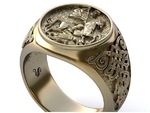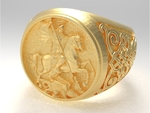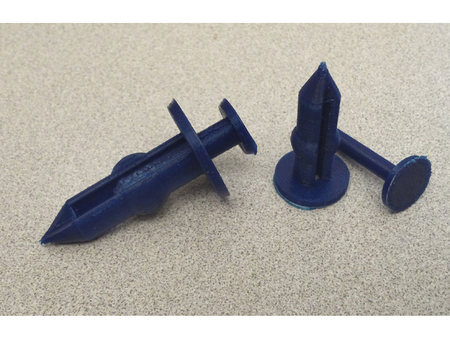Moscow ring (saint george) stl + 3dm 3D for print
6811 Views 8 Likes 9 Downloads Download the piece here from 3dforprint
From Wikipedia, the free encyclopedia
Jump to navigationJump to search
"St George" redirects here. For other uses, see Saint George (d...isambiguation).
Saint George of Lydda
Hans Süß von Kulmbach (zugeschr.) - Heiliger Georg.jpg
Portrait by Hans von Kulmbach (circa 1510)
Martyr
Born Cappadocia
Died 23 April 303
Nicomedia, Bithynia, Roman Empire[1][2]
Venerated in
Catholic Church
Eastern Orthodox Church
Oriental Orthodoxy
Church of the East
Anglican Communion
Lutheranism
Umbanda
Major shrine
Church of Saint George, Lod
St. George Syro-Malabar Catholic Forane Church, Edappally
St. George Orthodox Church Puthuppally Pally
Feast
23 April (Saint George's Day)
6 May (Gregorian when Julian date is observed)
23 Parmouti (Coptic calendar, 1 May)[3]
Attributes Clothed as a crusader in plate armour or mail, often bearing a lance tipped by a cross, riding a white horse, often slaying a dragon. In the Greek East and Latin West he is shown with St George's Cross emblazoned on his armour, or shield or banner.
Patronage Many Patronages of Saint George exist around the world
Saint George (Greek: Γεώργιος, Geṓrgios; Latin: Georgius; d. 23 April 303[4]), also George of Lydda, was a soldier of Cappadocian Greek origins, member of the Praetorian Guard for Roman emperor Diocletian, who was sentenced to death for refusing to recant his Christian faith. He became one of the most venerated saints and megalo-martyrs in Christianity, and he has been especially venerated as a military saint since the Crusades.
In hagiography, as one of the Fourteen Holy Helpers and one of the most prominent military saints, he is immortalised in the legend of Saint George and the Dragon. His memorial, Saint George's Day, is traditionally celebrated on 23 April. (See under "Feast days" below for the use of the Julian calendar by the Eastern Orthodox Church.)
England, Ethiopia, Georgia, Catalonia, and several other nation states, cities, universities, professions and organisations all claim Saint George as their patron.
Ring most commonly refers either to a hollow circular shape or to a high-pitched sound. It thus may refer to:
Ring (jewellery), a circular, decorative or symbolic ornament worn on fingers, toes, arm or neck
Ring may also refer to:
A ring is a round band, usually of metal, worn as ornamental jewellery. The term "ring" by itself always denotes jewellery worn on the finger; when worn as an ornament elsewhere, the body part is specified, e.g. earrings, neck rings, arm rings, and toe rings. Rings always fit snugly around or in the part of the body they ornament, so bands worn loosely, like a bracelet, are not rings. Rings may be made of almost any hard material: wood, bone, stone, metal, glass, gemstone or plastic. They may be set with gemstones (diamond, ruby, sapphire or emerald) or with other types of stone or glass.
Although people wear some rings as mere ornaments, or as conspicuous displays of wealth, rings have symbolic functions in relation to marriage, exceptional achievement, high status or authority, membership in an organization, and the like. Rings can be made to sport insignia to be transferred in an impression in a wax seal, or outfitted with a small compartment in which to conceal things. In myth, fable, and fiction, rings are often endowed with spiritual or supernatural significance.
Designer
CNC Models3d model description
Saint GeorgeFrom Wikipedia, the free encyclopedia
Jump to navigationJump to search
"St George" redirects here. For other uses, see Saint George (d...isambiguation).
Saint George of Lydda
Hans Süß von Kulmbach (zugeschr.) - Heiliger Georg.jpg
Portrait by Hans von Kulmbach (circa 1510)
Martyr
Born Cappadocia
Died 23 April 303
Nicomedia, Bithynia, Roman Empire[1][2]
Venerated in
Catholic Church
Eastern Orthodox Church
Oriental Orthodoxy
Church of the East
Anglican Communion
Lutheranism
Umbanda
Major shrine
Church of Saint George, Lod
St. George Syro-Malabar Catholic Forane Church, Edappally
St. George Orthodox Church Puthuppally Pally
Feast
23 April (Saint George's Day)
6 May (Gregorian when Julian date is observed)
23 Parmouti (Coptic calendar, 1 May)[3]
Attributes Clothed as a crusader in plate armour or mail, often bearing a lance tipped by a cross, riding a white horse, often slaying a dragon. In the Greek East and Latin West he is shown with St George's Cross emblazoned on his armour, or shield or banner.
Patronage Many Patronages of Saint George exist around the world
Saint George (Greek: Γεώργιος, Geṓrgios; Latin: Georgius; d. 23 April 303[4]), also George of Lydda, was a soldier of Cappadocian Greek origins, member of the Praetorian Guard for Roman emperor Diocletian, who was sentenced to death for refusing to recant his Christian faith. He became one of the most venerated saints and megalo-martyrs in Christianity, and he has been especially venerated as a military saint since the Crusades.
In hagiography, as one of the Fourteen Holy Helpers and one of the most prominent military saints, he is immortalised in the legend of Saint George and the Dragon. His memorial, Saint George's Day, is traditionally celebrated on 23 April. (See under "Feast days" below for the use of the Julian calendar by the Eastern Orthodox Church.)
England, Ethiopia, Georgia, Catalonia, and several other nation states, cities, universities, professions and organisations all claim Saint George as their patron.
Ring most commonly refers either to a hollow circular shape or to a high-pitched sound. It thus may refer to:
Ring (jewellery), a circular, decorative or symbolic ornament worn on fingers, toes, arm or neck
Ring may also refer to:
A ring is a round band, usually of metal, worn as ornamental jewellery. The term "ring" by itself always denotes jewellery worn on the finger; when worn as an ornament elsewhere, the body part is specified, e.g. earrings, neck rings, arm rings, and toe rings. Rings always fit snugly around or in the part of the body they ornament, so bands worn loosely, like a bracelet, are not rings. Rings may be made of almost any hard material: wood, bone, stone, metal, glass, gemstone or plastic. They may be set with gemstones (diamond, ruby, sapphire or emerald) or with other types of stone or glass.
Although people wear some rings as mere ornaments, or as conspicuous displays of wealth, rings have symbolic functions in relation to marriage, exceptional achievement, high status or authority, membership in an organization, and the like. Rings can be made to sport insignia to be transferred in an impression in a wax seal, or outfitted with a small compartment in which to conceal things. In myth, fable, and fiction, rings are often endowed with spiritual or supernatural significance.
